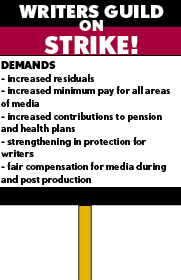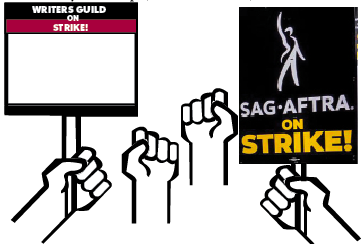The Writers Guild of America or the WGA went on strike May 2.
On July 14, the Screen Actors Guild — American Federation of Television and Radio Artists, or SAG-AFTRA joined them.
As of Monday September 25, our paper sends to print, and AMPTP is meeting the WGA to come to a tentative agreement.
The last time the writers and actors went on strike against the Alliance of Motion Picture and Television Producers, or AMPTP together was 1960, and after more than 60 years without another strike together, it’s about time it happened again.
The threat of a strike had been looming over Hollywood for some time with the rise of streaming. According to the WGA’s report released on March 14, titled “Writers Are Not Keeping Up,” studios are using the transition to streaming to cut writer pay and to keep writing separate from production.
The report also states that “while series budgets have soared over the past decade, median writer-producer pay has fallen.” They also point out that in regards to feature films with an adjustment for inflation “screen pay has declined 14% in the last five years.”
Many demands the unions are making are things that many people believed that they already had. For example, being paid for a show they worked on when it’s viewed on streaming; because yeah, all those times you rewatched your favorite show on Netflix, the writers and actors behind it were not being fairly compensated for that work. 
Many of SAG-AFTRA’s demands align with the writers, except for a demand for rules regarding self audition tapes. Following Covid, these became a standard in the industry. But, with most actors not being millionaires like the same ones you see every year at the Oscars, paying for good equipment to do a professional audition tape for a job you may not even land is unreasonable.
Fran Drescher, current president of SAG-AFTRA, gave an interview to NPR regarding the standstill on negotiations stating, “the only standstill is that I think that they’re not wanting to come to the table because they’re hoping that they can hold out longer than we can hold out, but that is not in the spirit of negotiation.” She went on to say the studios’ greed and insatiable appetite for money is the real reason to blame for extending negotiations.
Negotiations have been largely unsuccessful apart from studios like A24 who quickly agreed to the terms of SAG-AFTRA and confirmed they were not at all tied to AMPTP and got 39 projects greenlit by the union.
If independent studios such as A24, among others, can agree to the terms of writers and actors, large studios absolutely can but are simply unwilling.
Many people forget with all the glitz and glam of Hollywood that many of the writers and actors behind the strike are just everyday people trying to make a break in a nearly impossible industry.
The A-List names you see standing out there at the picket lines are largely there in solidarity for writers and actors who are not making a living wage — A-list’s aren’t there for better pay.
Powerful and influential people siding with working people is a good thing for the cause and will help raise up the voices of those in need.
It’s important to stand with those on strike to show solidarity for the common man; behind the faces of your A-List’s is your neighbor. Lifting up other working people will create better lives, and in this case, media for the rest of us.
Never forget there’s a reason the saying, “boss makes a dollar, I make a dime,” exists. We may see Hollywood as a glamorized way to escape, but at its core, it’s still a business.




